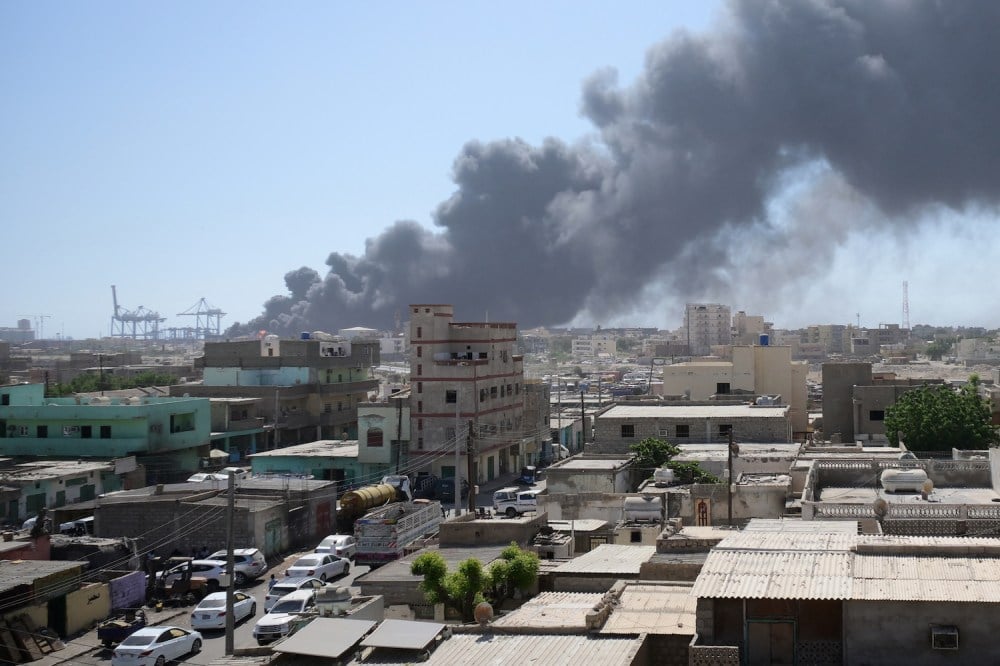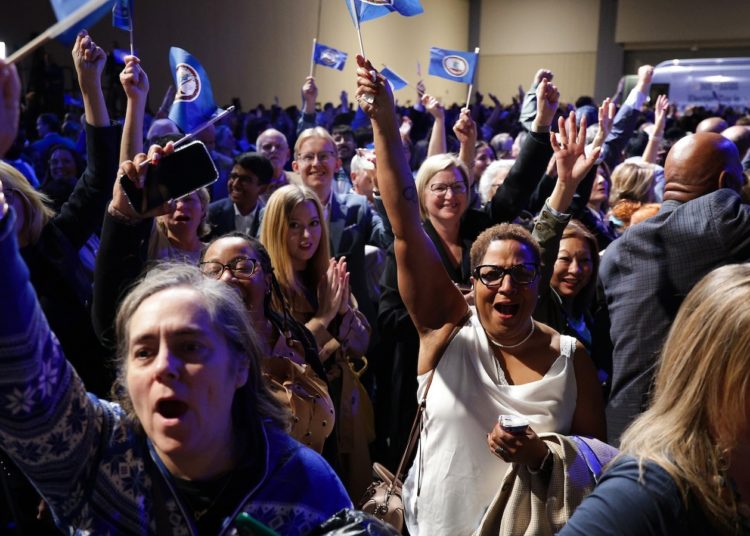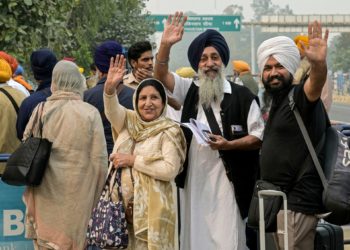Last month, as Sudan surpassed two years of war, Mohamed Hamdan Dagalo, known as Hemeti—the head of the paramilitary Rapid Support Forces (RSF)—announced that the RSF was establishing a parallel government in Darfur.
Meanwhile, at The Hague, a high-profile case brought by the Sudanese Armed Forces (SAF)— alleging that the United Arab Emirates has breached the U.N. Genocide Convention by supporting the RSF’s campaign in Sudan—has garnered global attention and bolstered the army’s profile. Though the top court dismissed the case this week, the SAF leadership, fronted by Abdel Fattah al-Burhan, successfully leveraged it for political gain in the past two months.
Amid continuous fighting, displacement, and horror in Sudan, it seems that both warring parties are increasingly focused on currying domestic and international favor. Despite the conflict that they have forced onto the Sudanese people, the RSF and SAF share the aim of preserving militarized, authoritarian rule in the country. But ultimately, a successful cease-fire, rebuilding process, and lasting peace require political leadership that comes from neither force.
The 2019 ouster of Omar al-Bashir, the dictator who ruled Sudan for three decades, aimed to usher in civil leadership, move the country toward democratic governance, and reinvigorate a broken economy. To ensure a cease-fire that allows Sudanese society to properly rebuild, the civil society leaders who have been at the forefront of mutual aid efforts during the war must be the loudest voice at any negotiating table.
Sudan’s postwar leadership must echo the demands of the civilian revolution—not prey on the country’s current vulnerability.
The RSF has never championed “peace and unity,” as it claimed in its announcement of the parallel government—it evolved from the Janjaweed, the militia group that launched genocidal campaigns against non-Arab tribes in Darfur in the early 2000s. In the past two years, RSF fighters have continued their brutal assaults across Sudan, particularly in the state of North Darfur. Since early 2024, the RSF has attacked and killed civilians throughout El Fasher, the state capital. This year, the militia launched an assault in the nearby Zamzam refugee camp, one of the largest in the country. Such attacks have forced both local and international relief organizations to halt their work in the famine-stricken area.
In the final weeks of U.S. President Joe Biden’s term, then-Secretary of State Antony Blinken declared that RSF-aligned troops were committing a genocide in Sudan and accused them of engaging in ethnic cleansing, rampant sexual violence, and crimes against humanity.
That genocide designation was supported by a United Nations fact-finding mission last year that found evidence of violations that “may amount to war crimes and crimes against humanity.” The increased attention to the atrocities committed by the RSF make the announcement of a rival government all the more frightening. Under the RSF’s proposed parallel system, the paramilitary group would govern its current strongholds—largely in western and southern Sudan, including a displacement camp in north Darfur where its soldiers killed hundreds of people just last month, according to U.N. estimates.
Though several international entities, including the African Union and the European Union, were quick to condemn the parallel government proposal, the RSF and its allies have been preparing for months now, including by conducting a high-profile meeting in Kenya in late February. Such legitimization—especially by another African nation—allows the RSF and its alleged international partners, such as the UAE, to continue their onslaught and act with impunity.
The RSF continues to inflict near-daily horrors on the people of Sudan: Just this week, the group launched several drone strikes on civilian infrastructure in densely populated Port Sudan, targeting fuel depots and the airport. It is preposterous to envision any postwar role for the RSF that doesn’t involve total political exile and prosecution at the world’s highest courts.
The SAF is not a viable option, either. After the civilian-led revolution that led to the military coup that ousted Bashir in 2019, the establishment of a power-sharing system between civilians and the military should have ushered in an era of civilian rule. Instead, the Burhan-led SAF overthrew the transitional government in 2021, imposed military rule alongside the RSF, and suppressed public frustration.
Though the SAF’s recent retaking of Khartoum raised hopes of a cease-fire, much of the enthusiasm was short-lived, as neither party showed a willingness to engage in legitimate peace talks. Ultimately, the army is not fit to serve as a suitable postwar leader, thanks to its own attacks against civilians during the past two years and its disregard for civilian input.
A recent Human Rights Watch report recounted several instances of the SAF engaging in the same acts of war as the RSF, including intentionally targeting civilians and their property; using military aircraft to indiscriminately bomb civilian neighborhoods and medical facilities; and carrying out sexual violence campaigns, which often went unreported because survivors and witnesses didn’t trust SAF-aligned authorities to help them.
The SAF’s exercise of administrative authority amid the conflict has paralyzed civilian response efforts and routinely suppressed the work of already-struggling aid groups, emergency response rooms, and food banks—often accusing them of collaborating with the RSF. The SAF’s active repression against humanitarian efforts led by civil society reflects trends that precede the war as well as an unwillingness to collaborate with the people attempting to mitigate its effects.
Both Burhan and Hemeti, who were once allies, are remnants of the Bashir era. They are solely concerned with their own power grabs and unafraid to thrust Sudan back into the dictatorial society that its people clawed the country out of in 2019.
Sudan’s war has killed more than 150,000 people and displaced more than 11 million; the country has collapsed into dysfunction as a growing number of people die from illness, starvation, and a complete lack of resources. To rebuild Sudanese society, a cease-fire between the SAF and the RSF is the absolute bare minimum.
However, as international organizations, coalitions, and entities mark the two-year anniversary of the war, many have sidestepped addressing what negotiations and reconstruction should look like. For instance, Arab stakeholders from both sides of the conflict were present during stalled discussions at last month’s failed London Sudan Conference, but the event left out any Sudanese participants—including independent civilian representation.
These performative moves undermine the credibility of Sudan’s peace process. On the same day that a UAE official called for an “independent, civilian-led government,” the RSF—which the SAF alleges that the UAE financially and politically supports—declared that it was establishing a rival government. (The UAE denies that it supports the militia.) The G-7’s call for a cease-fire glossed over foreign interference concerns and wrongly positioned the SAF and the RSF as Sudan’s chief rebuilding agents.
Though it is impossible to keep the SAF and RSF out of negotiations entirely, foreign partners must insist on a lasting peace in Sudan—not a temporary cease-fire—and amplify the voices of Sudanese civil society leaders.
Despite facing violence from both parties and severe funding cuts after U.S. President Donald Trump’s administration dismantled the U.S. Agency for International Development, civil society groups and humanitarian workers have been vital to the survival of millions of people across Sudan.
The so-called Emergency Response Rooms born out of the 2019 revolution have stepped in to fill the void left by the country’s decimated medical system. Community kitchens have fought back against rising starvation, even as famine returns to Sudan for the first time since 2017. However, many have been forced to shut down in the past month due to dwindling international support and aid blockades imposed by the RSF and SAF.
The informal neighborhood collectives that aid sexual assault survivors, individuals distributing aid to their communities, and youth-led political resistance groups have kept Sudan alive—despite every effort to destroy it.
These groups have loudly demanded their seat at the table. From pushing to oust Bashir in 2019 to demonstrating the role of mutual aid in governance over the past two years, the Sudanese people have shown how civilian rule ensures the brightest future.
Sudanese civil society is not monolithic. Civilian figures such as former Prime Minister Abdalla Hamdok proved controversial among the Sudanese public. This only underscores the necessity for trusted parties—such as leaders of Emergency Response Rooms or women’s empowerment groups—at the table. Their wide reach and understanding of the daily implications of the war make them key participants to tap in peacebuilding talks.
It’s easy to reduce Sudan’s misunderstood conflict to a black-and-white civil war, disregarding the intertwined legacies of the SAF and RSF, along with the international powers allied with either side. The Sudanese people shouldn’t be reprimanded for celebrating army victories, as they likely mark a glimmer of hope—but Sudan deserves better. The Sudanese people deserve better, and they must be at the forefront of postwar reconstruction.
The post Military Rule Is Not the Answer to Sudan’s Conflict appeared first on Foreign Policy.




